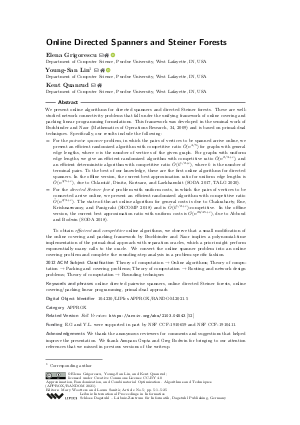@InProceedings{grigorescu_et_al:LIPIcs.APPROX/RANDOM.2021.5,
author = {Grigorescu, Elena and Lin, Young-San and Quanrud, Kent},
title = {{Online Directed Spanners and Steiner Forests}},
booktitle = {Approximation, Randomization, and Combinatorial Optimization. Algorithms and Techniques (APPROX/RANDOM 2021)},
pages = {5:1--5:25},
series = {Leibniz International Proceedings in Informatics (LIPIcs)},
ISBN = {978-3-95977-207-5},
ISSN = {1868-8969},
year = {2021},
volume = {207},
editor = {Wootters, Mary and Sanit\`{a}, Laura},
publisher = {Schloss Dagstuhl -- Leibniz-Zentrum f{\"u}r Informatik},
address = {Dagstuhl, Germany},
URL = {https://drops.dagstuhl.de/entities/document/10.4230/LIPIcs.APPROX/RANDOM.2021.5},
URN = {urn:nbn:de:0030-drops-146987},
doi = {10.4230/LIPIcs.APPROX/RANDOM.2021.5},
annote = {Keywords: online directed pairwise spanners, online directed Steiner forests, online covering/packing linear programming, primal-dual approach}
}

 Creative Commons Attribution 4.0 International license
Creative Commons Attribution 4.0 International license










































































